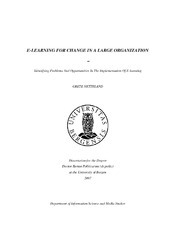| dc.description.abstract | Taking e-learning into use in the workplace, represents a major challenge for the adopterorganization. In practice, many e-learning implementations do not achieve the expectedoutcomes. While the mainstream literature on workplace e-learning mainly recommends astandardized implementation process, where the same type of implementation approach isused in all parts of the company, this study suggests that at least large, multilevel and complexorganizations need to adopt a differentiated implementation process that takes the variousorganizational units into account.This research focuses on how e-learning can be used as a tool for change. Based on a casestudy of a large-scale implementation of enterprise-wide e-learning in the largest Norwegiantelecommunications company, Telenor, the challenges arising in different work contextsduring the different parts of the implementation are explored. In Telenor, e-learning wasintroduced as a strategic tool to support a massive relocation of more than 6000 employees toa new headquarter, and, in the long run, to build a learning organization. A further aim was tomake learning more cost effective and more efficient.To analyze the unfolding implementation process, a socio-cultural perspective is used as anumbrella for the research. This perspective offers a framework for viewing the implementationas a situated and dynamic practice, mediated by physical and intellectual artefacts. Theanalysis is inspired by Activity Theory, another practice-based approach, which gives theopportunity to view the implementation activities as dynamic processes and non-isolated unitswithin a network of interacting activity systems. Selected aspects of this theory are applied asa conceptual framework in order to understand the problems encountered when implementinge-learning enterprise-wide as well as to enlighten the opportunities for development thatemerged in different parts of the company over a period of four years. In addition I draw onthe theory of development of work, grounded theory, theory of action, and theories ofinnovation and strategic staff development.The research identifies the long term factors that contributed to the sustainability of e-learningin different parts of the organization, and recommends that future e-learning implementationsfocus on: treating e-learning as a complex artefact; establishing specific roles in theimplementation process; and, challenges that emerge when e-learning is integrated with work.Most importantly, throughout the dissertation the importance of understanding context isstressed as the key issue for large-scale implementations in heterogeneous organizations. Bythis I contribute to the workplace e-learning literature. | en_US |
